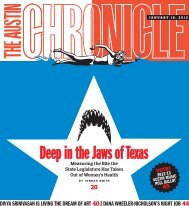March 27, 2009 - The Austin Chronicle
March 27, 2009 - The Austin Chronicle
March 27, 2009 - The Austin Chronicle
Create successful ePaper yourself
Turn your PDF publications into a flip-book with our unique Google optimized e-Paper software.
NEWSPity the Family-Planning ClinicAs reported last week (“Low-Income WomenCould Take a Hit,” <strong>March</strong> 20), family-planningadvocates are up in arms over a proposedstate Senate budget rider they fear woulddismantle a health-care system that providescare for thousands of uninsured and underinsuredTexas women. Senate budget rider 56,by Sen. Robert Deuell, R-Greenville, proposesawarding more than $50 million in fundsover the 2010-11 biennium solely to “publicproviders” of family-planning services and to“private and not-for-profit contractors” thatprovide “primary and preventative care” inaddition to family-planning services.Roughly two dozen traditional providers offamily-planning health services, such asPlanned Parenthood, could be renderedineligible for public funding under the proposal.For many uninsured and poor women, familyplanninghealth services are the only medicalcare they receive. According to the Guttmach erInstitute, 60% of women who access servicesat family-planning clinics consider the clinicstheir primary source of health care. In additionto providing access to contraception, traditionalfamily-planning services typically alsoprovide annual gynecological exams and regularscreenings for cervical and breast cancer,sexually transmitted diseasesand HIV, diabetes, hypertension,and anemia.This is the second time thatDeuell has authored a budgetrider diverting family-planningmoney from traditional providers.In 2005, he offered aversion of the current rider,diverting $10 million in fundsto first fund federally qualifiedhealth centers, which provide anumber of other primary care servicesin addition to family planning. Whilethe idea was, in theory, a good one – toexpand access to comprehensive healthcare for poor and uninsured women – therider did not have that effect. In 2005,before it took effect, the state’s family-planningprogram – funded with federal tax dollars– provided services to nearly 670,000clients. In 2006, after the rider took effect,the number of clients served dropped to442,000. That number hascontinued to decline to fewerthan 371,000 served lastyear. Meanwhile, the federallyqualified health centershave not been able to pickup the slack. Instead, therehaven’t been enough federallyqualified health centersusing the funding opportunityto spend the entire $10 million,so the centers haveactually been returning millionsin unspent funds to theDepartment of State HealthServices. As the number ofclients served decreasedfrom 2006 through 2008,the amount of Deuell’s 2005federally qualified health centerset-aside funding returnedto the state increased, fromabout $2.5 million in 2006to more than $4.2 million in2008. Meanwhile, the numberof women in need continuesto grow: Under the current funding structure,just 17.5% of women in need ofreproductive services are actuallybeing served.Despite that lack of success,Deuell – who is also amedical doctor – now wantsto direct the entire familyplanningbudget to countyhealth departments andother private and not-for-profitentities, including thesesame federally qualified healthcenters. If his new rider were tobecome law, it would “literally devastatethe family-planning program inTexas,” says Fran Hagerty, CEO of theWomen’s Health and Family PlanningAssociation of Texas. “It would dismantle itfrom the inside out – it would be a travesty.”Deuell’s office did not return numerous callsrequesting comment for this article. But JoePojman, executive director of the <strong>Austin</strong>-basedanti-abortion Texas Alliance for Life, saysthe rider “would be excellent policy.” It’s reallyCyclists Hope for Safe PassageBicycle advocates hope the third time’s the charm for the Safe Passing Bill, whichwould establish mandatory minimum distances that motorists must keep when passingbikes on the road. Historically, enforcement against motorists who’ve harassed, injured, orkilled cyclists has been weak, in part because few laws specifically address proper carbikeinteractions. A similar bill filed in 2005 was narrowly defeated in the Senate, and a2007 bill died. <strong>The</strong> current bill broadens its protections to more than just cyclists, requiringthat vehicles keep more than 3 feet of distance (or 6 feet for commercial vehicles)when passing any vulnerable road users, including bicyclists, disabled persons, maintenanceworkers, stranded motorists, runners, skaters, equestrians, motorcyclists, and farmequipment. Violation would result in a misdemeanor, incurring a fine of up to $500 forproperty damage; causing bodily injury would be a class B misdemeanor, with a fine ofup to $2,000 and sentence of up to 180 days in jail. <strong>The</strong> bill also includes penalties forharassment, throwing objects, and turning dangerously in front of vulnerable road users.Authored by Rep. Linda Harper-Brown, R-Irving, in the House (House Bill 8<strong>27</strong>) and DallasRepublican John Carona and longtime bike-boosting Dem Rodney Ellis of Houston in theSenate (Senate Bill 488), the bill had five bipartisan co-sponsors at press time and avote was pending in the House Committee on Transportation. – Daniel MottolaJANA BIRCHUM“in the best interest of women,” offeringaccess to one-stop comprehensive healthcare. For example, he said, if a woman were togo in for an exam and find out she had tuberculosis,she could get her TB treatment rightthere, without having to wait. And he doesn’tthink the system would have a problem absorbingthe hundreds of thousands of women whowould have to find new health-care providers.“Typically, providers expand to meet the need,especially when there are public funds available.”In fact, he said, women would have theability to be served at the office of “any primaryphysician.” Pojman would not say whetherhe saw this as a way to defund PlannedParenthood but said he thinks PlannedParenthood “does not serve women well.”What exactly that means isn’t clear. Fully97% of Planned Parenthood’s services are forfamily planning and preventative care, saysSarah Wheat, the group’s Central Texas vicepresident for community affairs. (Abortionrelatedservices make up a small percentageof Planned Parenthood’s business and, bylaw, are not paid for with public funds.)When to Stop Punishing SchoolsHouse Bill 3, the mammoth public school accountabilitybill, and its Senate counterpart, Senate Bill 3, are takinglonger than expected to come back to committee after publictestimony showed broad concerns that the new rules keep punishingschools for failure rather than helping them reform. Afterlengthy hearings <strong>March</strong> 17, the Senate Education and HousePublic Education committees started gathering the materialtogether for a new committee substitute that would take theconcerns into account. House committee staff confirmed thatChair man Rob Eissler, R-<strong>The</strong> Woodlands, had planned to bringthe bill back <strong>March</strong> 26, but the sheer volume and complexity ofmaterial made that impossible. <strong>The</strong> process is further complicatedby the two committees working together on the draft languagebefore it gets to the floor rather than hammering out aconsensus document in conference committee later. <strong>The</strong> currentplan is to start discussion again next week.– Richard WhittakerPlannedParenthood'sSarah WheatWheat agrees that diverting the state’s family-planningbudget would completely cripple asystem that, at present, provides critical servicesto an otherwise underserved population.“It’s just raw politics versus good policy,”she said. Indeed, according to Hagerty, ifthe rider were to become law, the state’s biggestproviders of services would be cut offfrom funding. While her group representsnearly 100 family-planning providers, theroughly two dozen that would likely bestripped of funding serve roughly half of thewomen that seek services each year.By attaching the measure as a rider andnot filing it as a bill, Deuell is able to avoidhaving it vetted by a wider body of lawmakersand can circumvent any public hearing process.(Sources say that not even theDepartment of State Health Services wouldhave an opportunity to weigh in on the measure.)Traditionally, riders are meant to clarifydetails of funding directives, not to make newlaw. But the new-law line is a gray area thatoften hinges on the interpretation of a committeechair – in this case the chair ofSenate Finance, Sen. Steve Ogden, R-Bryan,who has previously made it clear he is not afan of a family-planning system that grantsfunds to Planned Parenthood.Still, it’s unclear whether Deuell’s riderwould pass legal muster, says Anne Dunkelberg,associate director of the Center forPublic Policy Priorities. “I don’t think it wouldbe legal from the federal sense” to restrictthe potential recipients of funds any furtherthan do the federal agencies, she said. Inother words, it would not be legal for Texasto restrict federal family-planning funding toexclude groups eligible for that funding underfederal rules. “It is very likely that it wouldnot survive legal challenge,” said Dunkelberg.“I also think that it would be flat bad forwomen’s health. It would exclude a lot of providersbeyond Planned Parenthood.”– Jordan Smith16 T H E A U S T I N C H R O N I C L E MARCH <strong>27</strong>, <strong>2009</strong> a u s t i n c h r o n i c l e . c o m

















